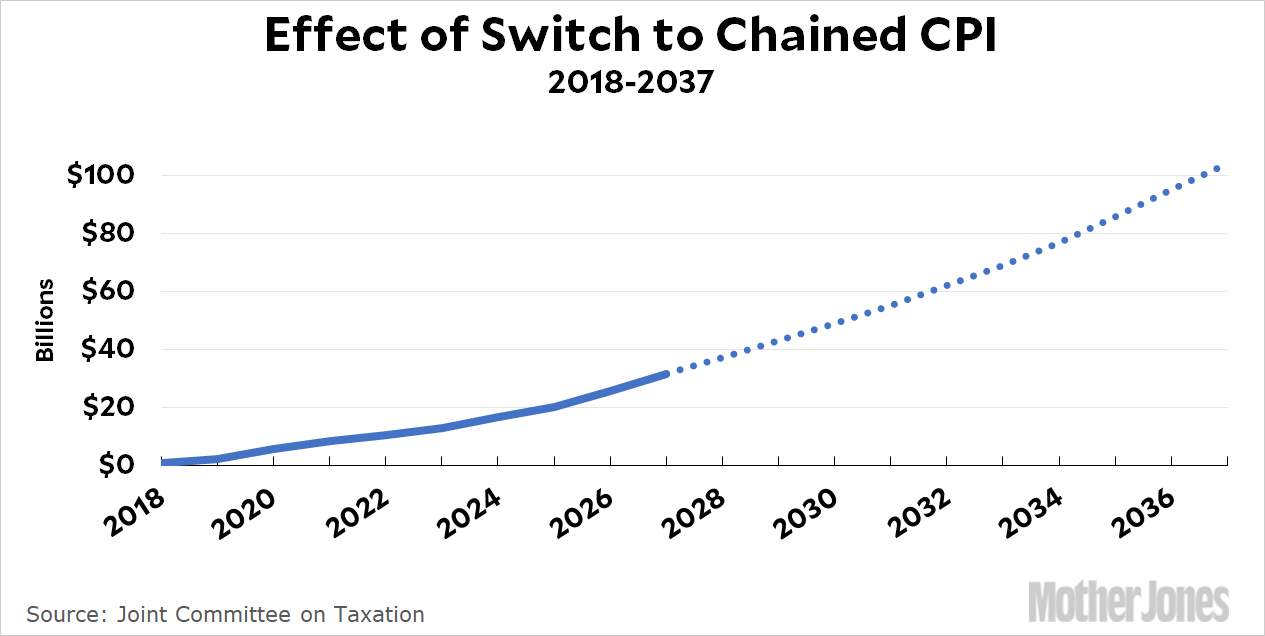Home › Forums › Political Corner › Six Things You Might Not Know About the Republican Tax Bill
This topic contains 7 replies, has 8 voices, and was last updated by ![]() narwhal 2 years, 1 month ago.
narwhal 2 years, 1 month ago.
- AuthorPosts
Well, the Republican tax bill [has passed]. You know the basics: it cuts corporate taxes permanently but cuts individual taxes only temporarily. It’s a pretty good deal for rich people, not so great for the middle class.
You may also know that we dodged some bullets. The tax on grad students got axed, for example. Likewise, Congress got cold feet at the last second about eliminating the Johnson Amendment, which bans churches from engaging in political activity.
But there are also some less savory provisions of the tax bill that you may not have heard of. Some of them have been there all along, while some got added at the last minute. Here’s a few of them:
Chained CPI
Republicans decided to use a new measure of inflation called chained CPI to calculate tax brackets. The problem is not that chained CPI is a lousy measure of inflation—it’s actually perfectly good—but that it works properly only if everything is measured using chained CPI. But everything isn’t. What this means in the real world is that people will get moved into higher tax brackets faster than before, and this will cost them a lot of money. Here’s the estimate from the Joint Committee on Taxation:

The JCT only projects things for ten years, but I’ve added projections for the next decade after that since chained CPI is a gift that keeps on giving. And it’s worth noting just how insidious this is. For the next few years no one will notice what’s happening because the impact is small and it’s covered up by the individual tax cuts in the bill. But those expire in eight years, just as the chained CPI provision really starts to pick up steam. This means that only after 2025 will middle-class taxpayers get hit with the full cost of the chained CPI provision. By 2037 it amounts to more than $100 billion, or roughly $1,000 per household.
So who wanted this, anyway? It’s been a Republican hobbyhorse for years as a stealth way of raising money to pay for tax cuts. This year, they finally did it.
Real-Estate Partnerships
At the last minute, a provision was added that dramatically reduced taxes on certain kinds of real-estate partnerships. Why? Sen. John Cornyn, who’s in charge of rounding up support for Republican bills, said it was inserted in order to “cobble together the votes we needed to get this bill passed.”
So who wanted this, anyway? That’s a surprisingly difficult question to answer. So far, no one has taken credit for this provision, but apparently it was added by Cornyn himself. As for who it benefits, the obvious answer is that it benefits anyone with large real-estate interests. For example, one of the votes that Cornyn needed to “cobble together” came from Sen. Bob Corker, who was dead set against the tax bill because it increased the deficit, but then suddenly changed his mind after this provision was added. By coincidence, the new rules will likely save him millions of dollars in taxes on his real-estate empire.
Anyone else of note? Well, there’s the guy who has to sign the tax bill into law: Donald Trump. It’s going to save him a bundle.
Carried Interest
This is not something that was added to the bill, but something that wasn’t. Like a zombie that just won’t die, the carried-interest loophole has survived yet again—despite the fact that President Trump campaigned repeatedly on eliminating it. Hedge fund billionaires across the country breathed another sigh of relief.
So who wanted this, anyway? Hedge funds and private equity managers, primarily. Despite Trump’s big talk, in the end no one wanted to anger folks who have billions of dollars in ready cash available for political contributions.
Alimony
Alimony payments are no longer deductible. This is, fundamentally, a tax on divorce (explanation here).
So who wanted this, anyway? Maybe evangelicals, who think divorce is sinful? It’s something of a mystery, since this provision raises only a pittance. In any case, it’s going to cost a bunch of middle-class ex-couples a lot of money.
Estate Tax
The estate tax exemption was raised to $11 million per person or $22 million per couple. You probably knew that. But there’s more.
First, that exemption amount is now indexed to inflation. When it comes to things like the minimum wage, Republicans flatly refuse to consider inflation indexing. But for millionaires and their heirs? Why of course we have to index.
Second, the bill provides a truly massive and inexplicable gift to heirs of the rich. Suppose you inherit some Apple stock that’s increased in value from $1 million to $30 million. Donald Trump’s 2016 campaign tax plan would have exempted the first $22 million, but then you’d have to pay capital gains taxes on the remaining $8 million. In other words, you had to pay taxes on something. Not anymore, though. Not only has the estate tax been eliminated for estates under $22 million, but the Republican bill keeps the current “step-up” law, which means assets are automatically revalued upon death and no capital gains taxes are due. If dad sells off his holdings himself, he has to pay capital gains on the profit. But if he dies and you sell it, you’re free and clear. Even the biggest proponents of killing the estate tax never imagined a gift this brazen.
So who wanted this, anyway? You don’t have to ask, do you? This has been an obsession of the ultra-wealthy for decades. They have long loathed the fact that they can’t control their fortunes even in death, and they loathe it even more that the federal government will get a cut of their hard-earned riches. With this tax bill, they have almost reached their goal of eliminating not just the estate tax, but taxes of any kind on their accumulated wealth.
37% tax rate for millionaires
At the last minute, Republicans decided that the super-rich deserved more of a break than they were already getting: the tax rate on income over $1 million was cut from 39.6 percent to 37 percent. Just for the record, an income of $1 million puts you above the top 1 percent. It’s somewhere around the top 0.3 percent.
So who wanted this, anyway? Rich people. Duh.
Alimony
Alimony payments are no longer deductible. This is, fundamentally, a tax on divorce (explanation here).
So who wanted this, anyway? Maybe evangelicals, who think divorce is sinful? It’s something of a mystery, since this provision raises only a pittance. In any case, it’s going to cost a bunch of middle-class ex-couples a lot of money.
I prefer to call it a tax on legalized slavery, the more pain alimony causes the more likely it is to be done away with. I genuinely hope that this crushes as many people as possible. Because then and only then they will be forced to fight this vile form of gynocentric servitude.
A MGTOW is a man who is not a woman's bitch!

Anonymous14I am a flat tax guy, f~~~ all this s~~~. You make more, you pay more, but you should pay at the same rate, and I say this as a poor man.
What my country really needs to do is stop spending Trillions waging war in other people’s interest, really would fix most of our problems, but nope, instead the whole country argues over s~~~ like this, just as they want us too.
I am a flat tax guy
I like the Fair Tax.
https://fairtax.org/about/how-fairtax-works
Ron Paul also supports it.
The average person is average. If you chain the cpi to inflation the average person will still be average.
The democrats negotiation tactic is average.
It’s better to be wealthy. Always has been always will be.
The wealthy pay taxes. The poor pay nothing. Most want something for nothing.
Wealth produces. Poverty consumes.
As Ayn Rand said, “the best way to deal with being poor is don’t be”
But, in the end, the law of averages say that x number will be wealthy and x number will be poor.
So, we shall continue to consume, consume, consume.
Peace brothers
Yeah I’m really not impressed. The middle class is still getting screwed the hardest. Oh well. Once i get my loans paid off I’m going to cut back and only work like 10-20 hours per week. There’s no incentive to work harder and work more when it means the government will just take more and you will effectively earn much less for you time. F~~~ that, my time is the most valuable thing i have.
Also, the personal tax cuts in the bill are due to sunset in about 10 years or so, while the corporate tax cuts are permanent. The bulk of people’s taxes will be going up in 10 years, unless the U.S congress acts on it. As things are now, they may not do that. As far as I understand here also, the tax deductions that were removed, won’t be coming back either.
In order for the tax plan to be sold to people, with which the polls were against it however, you had to show taxes were cut. Most people don’t give a damn about other people’s taxes being cut, if theirs aren’t either. There is this whole thing where a number of people believe they may become rich some day, so they don’t want things changed there, but most people don’t have that.
I suggest anyone interested, really look into this bill here.
By the way, I don’t subscribe to the “starve the beast” strategy to government budgets. The idea is to keep cutting taxes to make sure the government doesn’t have funds, so then there has to be cuts. It is also said, however, that the lower the cost you make things, the more people want of it. When you cut taxes, it makes government services cheaper for everyone, so they want more government services. Want to slash government spending? Try raising taxes, so people realize something has to give. It also helps to reduce deficits.
By the way, another kicker here… look into how westerns government generates money into the system. Anyone know how the government could generate money unless it borrowed it into existence? It isn’t even a pure fiat system either. What you have is a fiat system… with interest. They system keeps demanding more and more money in order to finance this debt.
Money as Debt goes into this:
"I am my own thang. Any questions?" - Davis S Pumpkins.
You make more, you pay more,
Why is that fair? Why is it that in everything but taxes, the cost is based on the market price and quality of the good/service provide? It is independent of the person’s income or ability to pay for the product or service.
The idea that those with a greater income should pay more taxes than those with less…really doesn’t make any sense. The rich don’t (or at least shouldn’t) get better government services than the poor or middle class, so why should they pay more.
I don’t even think a fair tax is really fair. There is no correlation between the amount of money you spend on products and services and the amount of government services you consume.
Really, the amount of tax should be the same in absolute dollars for all where services are consumed equally. That would be military spending, police and fire safety, elected officials etc. Where possible, people should pay as you consume. So schools should charge admission fees. Roads are funded by tolls and gas taxes. Maybe license and registration fees.
I can see where certain things, like education, benefit all, not just students, so I’m good with a subsidy that is equally paid by all citizens.
I understand that some are going to be too poor to pay for the services they need, but shouldn’t they at least be expected to pay ‘back taxes’ when they can? Shouldn’t they lose their ability to vote, to say how tax money is spent, when they contribute nothing in taxes?
Doesn’t this discourage government waste since it directly impacts all, they can’t expect the rich to pay for it. Doesn’t this encourage the private sector to fill in needs where it can? Doesn’t this discourage helping out the lazy that will not help themselves?
I understand that income inequality is a problem, but why is forcefully taking money from the rich (aka, theft) to give to the poor the right answer?
I’m not naïve, I know this sort of taxing system will never happen. I know that if it did switch over, the change would be significant and painful. But I’m not going to say that one citizen should pay more taxes then another when they both consume the same government services.
Ok. Then do it.
- AuthorPosts
You must be logged in to reply to this topic.

921526
921524
919244
916783
915526
915524
915354
915129
914037
909862
908811
908810
908500
908465
908464
908300
907963
907895
907477
902002
901301
901106
901105
901104
901024
901017
900393
900392
900391
900390
899038
898980
896844
896798
896797
895983
895850
895848
893740
893036
891671
891670
891336
891017
890865
889894
889741
889058
888157
887960
887768
886321
886306
885519
884948
883951
881340
881339
880491
878671
878351
877678













